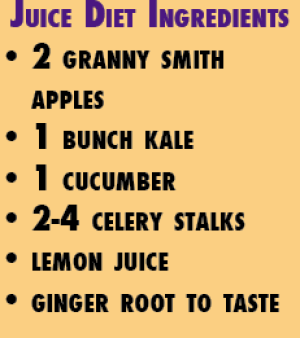Juice to Lose
April 4, 2013
Many people are turning to the Juice Diet for successful weight loss with minimal lifestyle change.
As described by The Huffington Post, the Juice Diet holds the theory that “unpasteurized, highly concentrated juice holds more nutrients, antioxidants and disease-fighting compounds than either bottled, pasteurized juices or the whole fruit or vegetable itself.”
The Juice Diet consists of various fruits and vegetables which are placed in a juicer and consumed by the recipient as determined by their diet plan. Some people substitute one juice for one meal, while others may substitute for every meal for a given period of time.
Sophomore Jacob Anderson lost 20 pounds on the Juice Diet without exercise or other lifestyle changes.
“In January I started replacing two meals a day with 16-20 ounces of juice,” he said. “It worked beautifully. The reason it worked, though, is because I ate about 1700 calories or less daily. I would recommend the diet, but it gets monotonous after a while.”
While some students have already experienced the diet firsthand, others are concerned with possible health conflicts that could occur.
“I definitely think it helps people lose weight because you’re not really eating,” said Katie Fowler, a first-year nursing student. “But it’s also unhealthy. It’s effective but dangerous.”
The Juice Diet creates health controversies among professionals, despite the diet detox craze that has surged since the 90s. While many people feel more energized, the source of said feelings is conflicting.
“Studies on starvation show the longer you fast, the more lethargic and less focused you become,” said Dr. Susan Moores to NBC News. “While people can lose 5 to 10 percent of their weight in the first few months of (a detox) diet, up to two-thirds of people regain even more weight than they lost within four or five years.”
The diet rejects basic instincts the body desires, creating a chemical imbalance within the body itself that may lead to weight loss.
“Psychologically there’s a dissatisfaction,” said Marilyn Lee, a nursing professor at UNA. “Chewing and swallowing, they provide a certain satisfaction. While I drink carrot juice, I don’t think I could always drink carrot juice rather than having the crunch of a real carrot.”
Celebrities such as Gwyneth Paltrow and Angelina Jolie have attributed weight loss to the Juice Diet, while still other celebrities acknowledge that while the diet works, it is temporary.
“I needed to lose (weight) really quick,” said Beyoncé Knowles in an interview with People. “I put the weight back on as soon as I finished, so I am no smaller or bigger than I’ve always been. It was strictly for the movie.”
Still, a properly implemented diet with a physician’s recommendation could lead to a healthy jump start to an improved lifestyle.
“Like with the vegetarian and vegan diets, you have to know what you’re doing,” Lee said. “You have to make sure you’re getting your proteins and proper nutrients and listening to what experts are saying. You have to do your research.”


